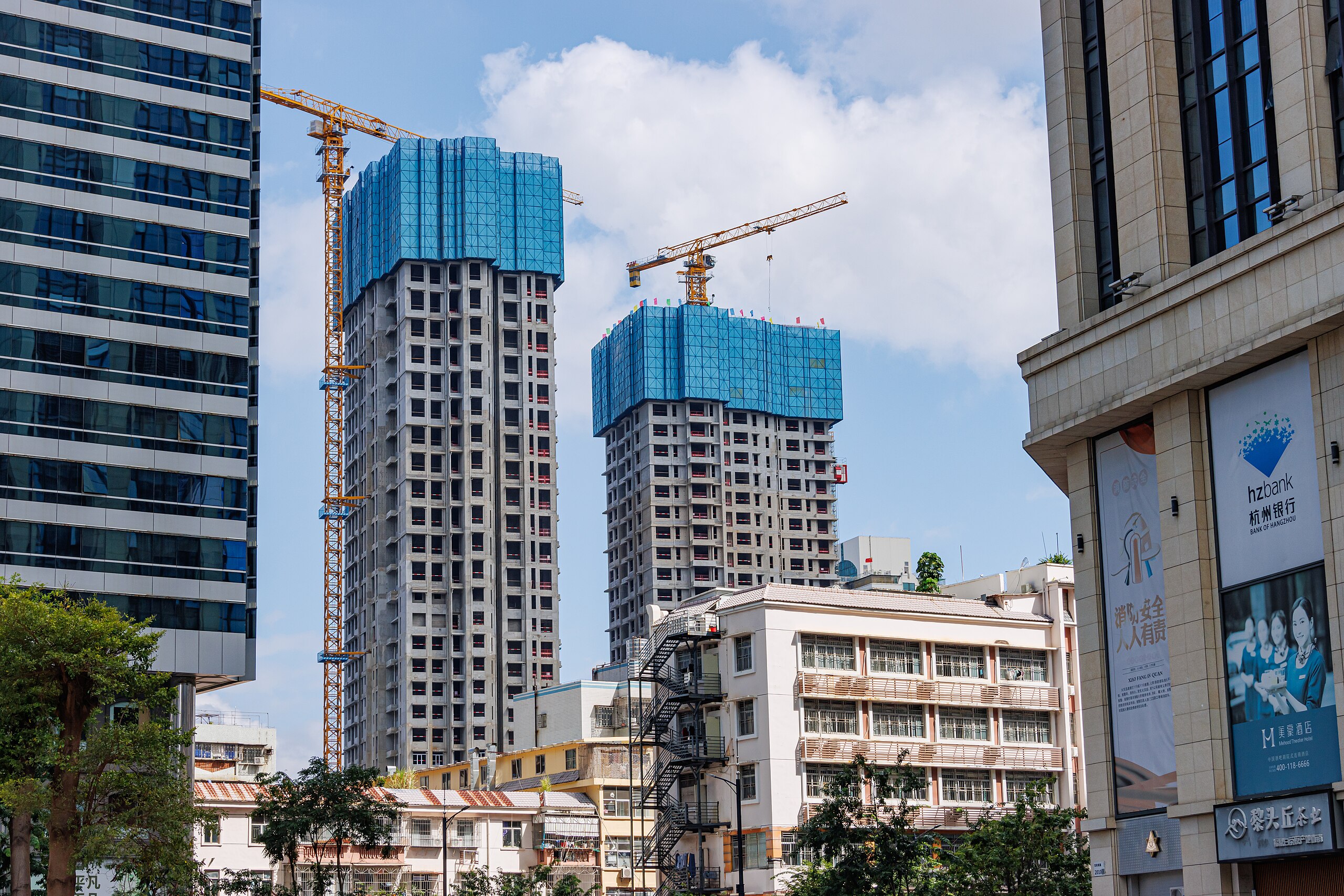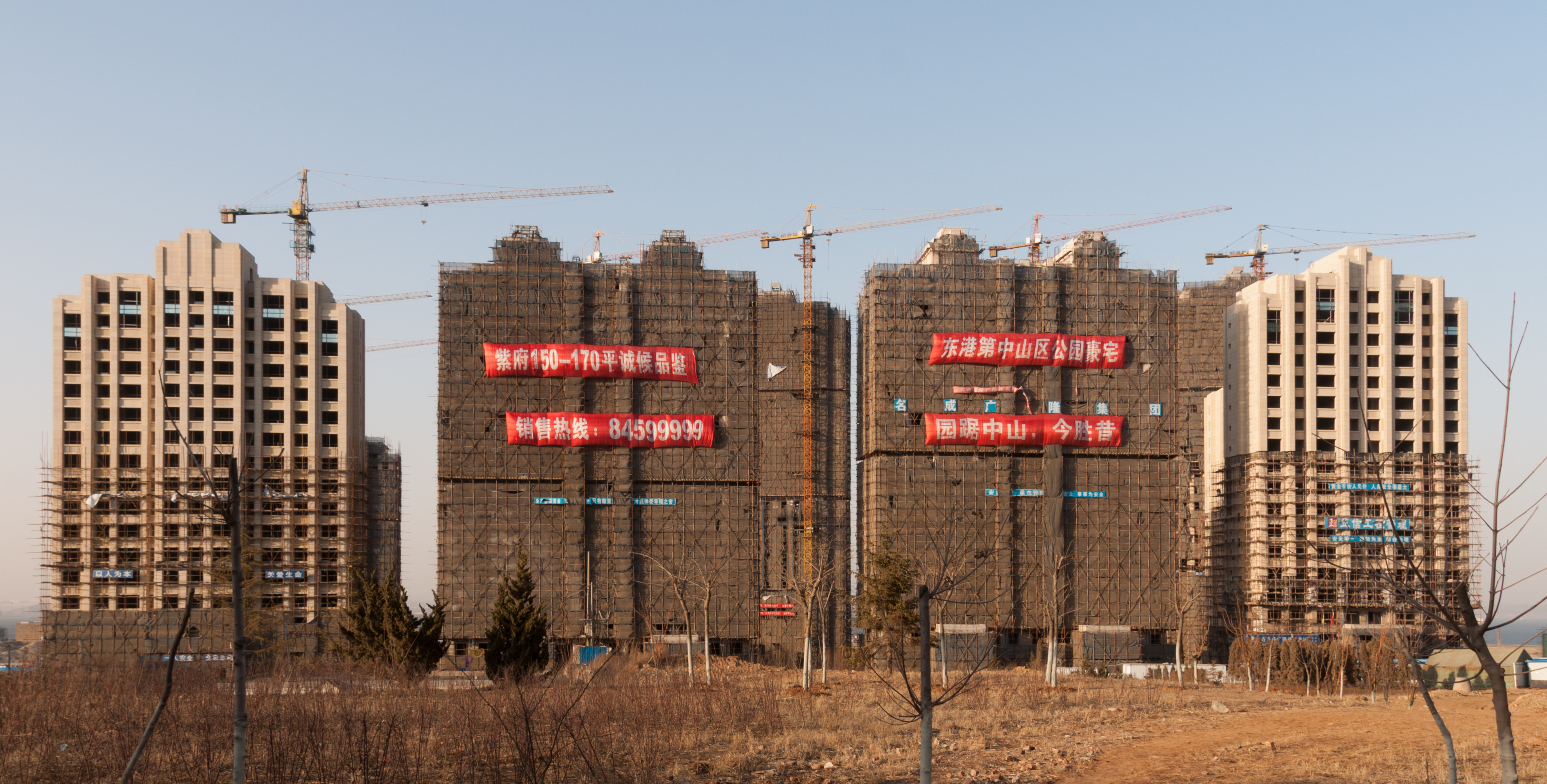Here’s why China’s economy is stumbling — but not about to fall

- Mounting debt has grounded China’s once-promising housing market to a screeching halt.
- Many Western journalists speculate the country is in for economic disaster, but economists Dan Rosen and Nicholas Lardy beg to differ.
- Both believe Beijing can resolve the housing crisis, but disagree on the sacrifices it has to make to do so.
On January 29, 2024, a court in Hong Kong ordered Chinese real-estate giant Evergrande Group to begin liquidating its assets. The company, founded in 1996, had taken advantage of China’s decades-long real estate boom, quickly becoming the biggest developer in the world. But by 2024, it had also become the most debt-ridden. Prohibited from borrowing more money to complete its construction projects — 1,322 according to statistics from the China Index Academy — Evergrande’s empire crumbled, sending shockwaves throughout the Chinese economy and, by extension, the world.
For years, it seemed like the only direction the Chinese economy could go was up. Once one of the poorest countries on Earth, China underwent an unprecedented transformation following the market-oriented reforms of CCP Chairman Deng Xiaoping, who, reminiscent of Vladimir Lenin’s short-lived New Economic Policy, opened up its state-owned markets to private enterprise. The growth kickstarted by these reforms, implemented in the 1970s, lasted well into the late 2010s. During this time, the Chinese economy consistently grew at a much faster pace than the U.S. or Western Europe, elevating the lion’s share of its 1.4 billion citizens from lower to middle class.
China’s housing crisis
As Chinese household income climbed, so did the demand for housing, a development that turned out to be both a blessing and a curse. China did not really have its own property market until the early 1980s when Xiaoping’s administration did away with the socialist welfare housing system that had been in place since the end of the revolution. China’s enormous population sustained a big boom in construction projects — so big that developers and local governments willingly went into debt to finance everything. This continued until 2020, when the CCP’s current Chairman, Xi Jinping, recognizing the unsustainability of the boom, passed his so-called Three Red Lines Policy, placing a cap on the amount of money developers could borrow to remain in business. Having gone way past this limit, Evergrande defaulted a year later, followed by 50 other companies.
The ongoing housing crisis has visibly shaken the previously unshakable Chinese economy, bringing down real estate prices and hitting the breaks on consumer spending. Workers are leaving big cities and returning to the countryside en masse, and millions of newly built apartment complexes remain eerily empty. Economic growth has plummeted to historic lows, falling from 14% in 2007 to just 2% in 2022, leading many observers in the West to wonder whether the Chinese dragon is lying on death’s door.
Questions are manifold. Is China’s economy a miracle, as people long thought, or an overspeculated bubble on the cusp of bursting? Does the current crisis represent a historic tipping point, or is it little more than a temporary setback from which the country will soon recover? Has the CCP been acting wisely in its efforts to keep everything under control, or is it merely applying ban aids without treating the underlying illness? Are Western reporters covering the events accurately, or have they been misled by misinterpreted data?
Two economists specializing in China — Daniel Rosen and Nicholas Lardy — share their surprisingly positive outlooks.
Changing gears
Rosen, a former Senior Adviser for International Economic Policy at the White House National Economic Council and active member of the Council on Foreign Relations and National Committee on US-China Relations, believes the housing crisis isn’t a misplay on the part of the Chinese government, but a natural and indeed expected obstacle on the country’s path to prosperity.
“China has come from being one of the poorest countries in the world during the beginning of its economic development to middle income today,” he told Big Think. “And when countries get to middle income, what’s needed to keep growth going changes. There generally is a period of difficult transition where old approaches to growth overstay their utility before countries do the hard work of changing gears.”

Rather than indicating a collapse of the Chinese economy, he believes the housing crisis serves as a signal that the country is entering a new chapter in its development. However, this does not mean the economy — or the politicians who preside over it — are going to emerge unscathed. “Growth slowdown is permanent,” Rosen said. “There’s no elegant way out of this.”
Asked if the CCP’s response to the crisis has been effective, Rosen answered: yes and no. “If we look at the Chinese government’s work report for 2024, the policy blueprint that comes out every year, you can see Beijing intends to increase its trade surpluses, but the notion that China can export its way out of a crisis and expect other countries to tolerate it is highly problematic.” With economic protectionism on the rise across the globe, many governments are placing hefty tariffs on Chinese imports, from consumer electronics to electric vehicles. As these tariffs rise, Chinese exports are expected to fall, obstructing Beijing’s hopes to offset its losses in the real estate market.
At the same time, Rosen believes that the CCP understands the crisis’s root cause and is taking actions to address it. “People have looked at the Three Red Lines as a mistake that somehow caused the stress on the property sector we’re seeing now,” he said. “I’d say the stress was inevitable and the policy was an attempt to start dealing with it. The broad strokes were entirely appropriate: There was too much debt being loaded onto the housing market. While it’s possible to use debt to get more growth in the short term, you just can’t do that forever.” He points to the so-called White List, a campaign that opened the credit spigot only to those construction projects that could be finished in a short time, as a step in the right direction.
Better late than never
Lardy, a nonresident senior fellow at the Peterson Institute for International Economics, is even more optimistic about China’s future. Like Rosen, he believes the Chinese economy is not going to collapse as a result of the housing crisis, that growth will continue at a less astronomic but nonetheless consistent rate, and that the CCP is more or less making the right choices while navigating the crisis.
“I think it should have been done years ago,” he says of the Three Red Lines Policy. “The fact that they were on an unsustainable path became clear as early as 8 years ago, and they should have tried to slow it down sooner, perhaps with less severe means. But my view is: better late than never.”

Asked why the CCP did not take action sooner if they knew where they were heading, Lardy, told Big Think that “the political economy made it difficult to take the kind of steps Beijing finally took.” He added that “there were strong vested interests in keeping the boom going,” from real estate developers building the properties to local governments selling the land to high-ranking officials taking credit for rising GDP. Bubbles only burst when overconfident buying turns into panic selling, and for a while the CCP might have thought that, by exercising its considerable control over both the economy and flow of information, they could prevent the ship from tipping over.
Still, when Beijing finally came around to dealing with the crisis, Lardy believes that it made the right calls. “Some say they need a bigger stimulus, fiscal push, or monetary expansion,” he said. “I do not agree with that. On the monetary side, I think they have gone as far as they can, given the interest rate environment they face globally. Their rates are already very low compared to those in the US, which has led to large capital outflows and depreciation of the currency, the renminbi. If anything, they’re trying to avoid further depreciation. On the fiscal side, they are being a bit more expansionary than they were last year. Again, they feel constrained because the levels of overall debt relative to GDP are high, creating certain risks. To control those risks, they are accepting a lower rate of economic growth.”
Lardy’s and Rosen’s assessment of the Chinese economy contrasts sharply with those provided by reporters working for finance-oriented publications, many of whom argue China is headed for considerable economic disaster. Lardy believes that, at least in some cases, their view is the result of misinterpreting crucial data. In a piece recently published in Foreign Affairs, he addressed what he judges as incomplete or inaccurate reporting on the Chinese economy:
“In October last year, The Economist pointed out that China’s GDP relative to the US had declined by 10% from 70-something to 60-something. They said, ‘China may never catch up to the US.’ I think that’s a complete misconception.” The problem, Lardy said, is that the reporters looked at nominal GDP, a measurement that spiked in the US but didn’t grow by much in real terms when taking into account inflation. This, combined with the depreciation of the renminbi — a depreciation Lardy believes to be temporary — made it seem as if China was falling far behind when, in actuality, it wasn’t, making the reporters’ aforementioned argument misleading.
The future of the Chinese economy
Rosen and Lardy both believe that China will survive the current housing crisis, but differ on the kinds of sacrifices its leaders will have to make.
According to Lardy, the country and its leadership are expected to emerge more or less unscathed. “I’m a big believer in convergence,” he said. “China still has incomparable prices. It still has a GDP that’s less than 30% that of the US, meaning there is substantial room for catchup. Once they work through this property bubble correction, they will have a period of sustained growth in the neighborhood of 5 to 6% per year,” the same growth rate they enjoyed before Evergrande went under.

Rosen is a bit more cautious. “Growth cannot come from the debt-driven property sector anymore,” he says, “and officials have not yet clarified where it’s going to come from instead.” The future of the Chinese economy, he adds, “will depend on the policy choices being made in Beijing. The best case scenario would be that leaders acknowledge the structural problems and headwinds to growth, write off some of the losses, distribute the pain in as fair a way as possible and, by doing that, work out the problems so that — after a period of maybe 0% growth lasting 3 to 5 years — the table would be set for stronger development moving forward.”
Rosen does not doubt that the CCP will be able to mitigate the fallout of the housing crisis. At the same time, he stressed that the wisest course of action — rebuilding the country’s economic system, creating more space for free enterprise, and incurring short-term losses in favor of long-term gains — might not be a course Beijing is willing to fully commit to just yet.
“Change is frightening,” he said. “Even if the CCP successfully works through this transition, it’s going to mean relinquishing the level of control over the economy they’d like to have. Ideally, they want strong growth and control, even though the modern world has discovered the hard way in the last 100 years that this isn’t an option; you cannot have full control over a system and at the same time have that system be dynamic and efficient. China is still looking for a way to have it all, and that search is getting in the way of what is, in my opinion, inevitable economic and policy reform.”





